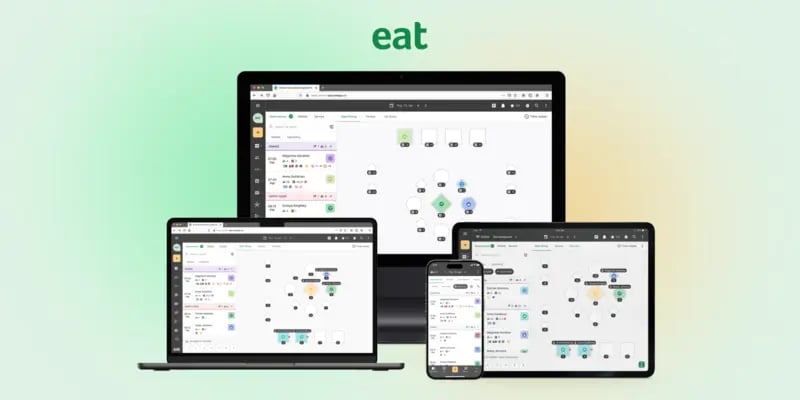Looking for ResOS alternatives for your restaurant reservations? This article covers the best options available in 2026, highlighting their key features and benefits to help you make an informed choice.
Key Takeaways
-
Restaurant owners seek a robust ResOS alternative due to the need for improved features, flexible pricing, and superior customer support.
-
EatApp, OpenTable, Tock, SevenRooms, ResDiary, and Tablein are notable alternatives, each offering unique features tailored to the operational needs of varying establishments.
-
Key factors in selecting a reservation system include advanced features, customer support quality, transparent pricing, and seamless integration with existing systems for optimized restaurant management.
Exploring top ResOS alternatives
.webp?width=640&height=366&name=ce4b7c46-0e17-4367-b667-2f8268bc7a33%20(1).webp)
Restaurant owners often find themselves needing alternatives to resOS for various reasons. The quest for a more robust reservation system stems from the desire for additional features and customised solutions that better align with their specific operational needs. One critical factor that heavily influences this decision is the quality of customer support. A system that can respond with prompt and effective support can make a significant difference in the day-to-day operations of a restaurant for customers.
Flexible pricing structures are another key consideration. Many restaurant owners look for systems that help optimize costs without compromising on essential, limited features. This flexibility can be particularly attractive for independent restaurants looking to manage their business budgets effectively.
Technological compatibility and advanced features like guest engagement, table turnover management, and compliance with regulations are also paramount in the hospitality industry.
A reservation system that integrates seamlessly with existing infrastructure and offers these core features can improve:
- operational efficiency and customer satisfaction,
- proceeding to improve overall service quality,
- security, connection, human experience, verification, advantage,
- and best fit.
This review highlights the importance of these elements.
With these factors in mind, let’s review some of the best ResOS competitors available in 2026.
Eat App

Eat App excels in providing analytics, guest profiling, and CRM features customized for all restaurant sizes. The platform’s analytics tools help track customer data and optimize service, while detailed guest profiling enables personalized dining experiences. Additionally, the integration of various apps improves the overall functionality of the service.
The availability of a free trial period allows restaurants to test features before committing, and the general pricing includes a free plan, with the pro plan priced at $223. Eat App’s focus on providing valuable insights and personalized service makes it a strong contender for restaurants looking to enhance their guest experience.
For establishments seeking a platform with robust analytics and CRM capabilities, Eat App offers a compelling solution. Its flexible pricing and powerful tools support improved customer engagement and operational efficiency.
Plus, Eat App offers:
-
WhatsApp Messaging: Instantly update and remind guests.
-
Loyalty Suite: Reward repeat guests and increase retention.
Eat App's Pricing Plans
-
Free Plan – $0/month: Up to 30 covers per month.
-
Starter Plan – $69/month: Up to 300 covers monthly.
-
Basic Plan – $139/month: Unlimited covers each month.
-
Pro Plan – $239/month: Full access to guest experience tools.
Honestly, Eat App is the best reservation system I have worked with, and the support team is great. They reply to you at 11 pm at night, and this is what a restaurant needs.
Tablein
.webp?width=640&height=366&name=07670142-b9be-4ac7-ba1c-909d0c9b1e71%20(1).webp)
Tablein stands out with its emphasis on user experience and simplicity. Designed with a user-friendly interface, it ensures a seamless handling of reservations, making it easy for staff to get onboard quickly and efficiently. This platform’s ability to manage online reservations and waitlists improves the guest booking experience significantly on the website.
Real-time availability tracking is another notable feature of Tablein, preventing double bookings and ensuring a smooth dining experience for guests. Additionally, the platform allows for easy modification of reservations, accommodating changes in guest numbers and timings seamlessly. Automated notifications via email and SMS help reduce no-shows by reminding guests of their scheduled reservations.
Operational management tools are also a highlight, with a sleek UI and critical insights presented in a single dashboard. These tools not only aid in table management but also provide valuable data to optimize restaurant operations. With a focus on improving both guest and staff experiences, Tablein is a compelling ResOS alternative.
Tablein Pricing Plans
-
Basic Plan – $99/month: Includes up to 315 reservations per month.
-
Pro Plan – $149/month: Allows unlimited monthly reservations.
Quick takeaway
Eat App offers deeper CRM features, POS integrations, and marketing automation tools, making it more suitable for high-volume or data-driven restaurants. Tablein is simpler and more suited to small restaurants seeking basic online reservations without advanced analytics or integrations.
Further reading
OpenTable

OpenTable, another ResOS alternative, is a powerhouse in the reservation platform industry, renowned for its extensive network of diners and powerful features. It offers real-time table management, turn and flow controls, and ticketed event capabilities, all designed to improve the dining experience. This level of control and flexibility is particularly beneficial for large, high-volume establishments.
The pricing structure is tiered, with the Basic plan incurring a cover fee for every reservation, while the Core plan is priced at $299 per month, and the Pro subscription costs $499 per month, potentially leading to extra fees. This makes OpenTable more suitable for larger restaurants that can utilize its extensive features and access to a vast diner network.
For restaurant owners looking for a comprehensive table booking system that supports large-scale operations, OpenTable provides a reliable and feature-rich solution. Its robust capabilities and extensive diner access make it a top choice for high-volume restaurants aiming to optimize their table management and guest experiences.
OpenTable Pricing Plans
-
Basic Plan – $39/month: Charges $1.50 per cover booked through the OpenTable network and $0.25 per cover via the booking widget.
-
Core Plan – $249/month: Includes a $1 per cover fee for bookings made through the OpenTable network.
-
Pro Plan – $449/month: Also includes a $1 per cover fee for OpenTable network bookings.
Quick takeaway
Eat App does not charge per cover, allowing restaurants to save significantly on booking fees while gaining full access to guest data and advanced CRM tools. In contrast, OpenTable charges per cover and limits data access.
Further reading
Tock
Tock offers a unique blend of reservation and table management features for fine-dining restaurants, wineries, and venues with ticketed experiences. Its features include free, deposit, and prepaid reservations, dynamic pricing, and floorplan optimization, all designed to enhance operational efficiency and guest satisfaction.
However, Tock’s slower response time compared to competitors and limited ease of use are noted drawbacks. Despite these challenges, its pricing structure, starting at $199 per month with additional fees for certain features, offers value for establishments that can benefit from its specialized offerings.
For restaurants and venues looking for a platform that supports dynamic pricing and optimized floorplans, Tock presents a compelling option. Its specialized features make it a better fit for venues that prioritize unique dining experiences and ticketed events.
Tock Pricing Plans
-
Base Plan – $99/month
Includes walk-in waitlist tools, table and guest management, marketing tools, and 2-way SMS communications. A 3% fee applies to prepayments. -
Essential Plan – $269/month
Offers all Base features plus reservations, experience essentials, takeout management, and a reservation request waitlist. A 3% fee applies to prepayments. -
Premium Plan – $399/month
Includes all Essential features, along with a premium experience suite, POS integrations, API access, webhooks, and high-touch support via chat, email, and phone. A 2% fee applies to prepayments. -
Premium Unlimited Plan – $899/month
Provides all Premium features with the added benefit of no fees on prepayments. -
Enterprise Solutions – Custom Pricing
Customised for larger operations, this plan includes a complete reservation, table, takeout, event, and guest management system with unlimited covers, users, and devices.
Quick takeaway
Compared to Tock, Eat App doesn’t charge per-cover or prepayment fees and offers more advanced CRM tools with full access to guest data. These tools help restaurants build stronger customer relationships and increase profitability.
Further reading
Sevenrooms
.webp?width=640&height=366&name=6b514aca-a3ba-4f3f-b1b5-f244facb1ceb%20(1).webp)
Sevenrooms, one of ResOS' competitors, stands out for its comprehensive approach to restaurant management, guest engagement, and marketing automation. The platform’s advanced customer analytics allow restaurants to create detailed customer profiles, enhancing personalized marketing and guest management.
Key features include:
- managing bookings,
- personalizing experiences,
- and automating marketing campaigns with Campaign Monitor.
While the pricing starts at $499 per month and is custom-tailored to each venue, the platform’s powerful tools justify the cost for many restaurants. User feedback is largely positive, although some users express concerns about complexity and customer experience.
For establishments seeking a comprehensive reservation and guest experience platform, Sevenrooms offers a robust solution. Its advanced features and customization options make it ideal for restaurants looking to elevate their guest engagement and operational efficiency.
Quick takeaway
Unlike Sevenrooms, which primarily focuses on reservations and guest profiles, Eat App goes further with features like AI-powered guest segmentation, food preference tagging, real-time WhatsApp and SMS marketing, shared databases across locations, and automated loyalty tracking.
ResDiary
ResDiary offers commission-free reservations, a customizable web widget, and integrations for online orders, making it a versatile choice for many restaurants. Its straightforward pricing model, starting at £99 per month, allows for clear budgeting without hidden fees. Additionally, ResDiary provides resos offers that improve the overall experience.
However, the lack of prepayment options is a noted drawback. Despite this, ResDiary’s features and integrations make it a valuable tool for managing reservations and enhancing online visibility.
For restaurant owners seeking a cost-effective and versatile reservation system, ResDiary provides a reliable option as a ResOS alternative. Its commission-free model and extensive integrations support streamlined operations and improved guest experiences.
ResDiary Pricing Plans
-
Connect Plan – €99/month
-
Express Plan – €129/month
-
Pro Plan – €189/month
-
Ultimate Plan – €289/month
Further reading
Key factors in choosing a reservation system
.webp?width=640&height=366&name=f3ae17f4-fa0c-49ab-be7b-a183df881190%20(1).webp)
Choosing the right reservation system involves considering various critical factors. Advanced features such as automated reminders, loyalty programs, and dynamic pricing strategies can significantly enhance restaurant management and guest satisfaction. It’s essential to select a system that can manage reservations efficiently while also providing valuable insights through reporting and analytics.
Customer support and user feedback play important roles in this decision. Platforms that offer prompt and effective support options can reduce operational stress and enhance overall service quality. Additionally, the pricing model should be transparent, with options that align with the restaurant’s budget and operational needs.
Integrations with other management systems, the ability to create detailed guest profiles, and features that enable personalized service are also vital considerations. Considering these key factors helps restaurant owners find a reservation system customised to their unique needs, supporting long-term success.
Summary
Summarizing the key points discussed, it’s evident that finding the right reservation system is crucial for optimizing restaurant operations and improving guest experiences. From Eat App’s user-friendly interface to OpenTable’s extensive diner network (at a hefty price), each ResOS alternative offers unique benefits that cater to different needs.
It’s important to evaluate each option based on specific criteria, such as advanced features, customer support, pricing models, and technological compatibility. By doing so, restaurant owners can ensure they select a system that aligns with their operational goals and enhances overall efficiency.
Ultimately, the right reservation system can transform how a restaurant operates, providing a seamless and enjoyable experience for both staff and guests. As you explore these alternatives, consider your unique requirements and choose the platform that best supports your vision for success.














.webp?width=200&name=reserve_with_google%20(1).webp)
.jpeg?width=200&name=Eat%20App%20Co-founders%20(2).jpeg)
-1.png?width=1812&height=1072&name=TripAdvisor%20%26%20More%20Bookings%20(1)-1.png)
-2.png?width=1812&height=1072&name=Google%20Bookings%20(1)-2.png)


-1.png?width=200&name=TripAdvisor%20%26%20More%20Bookings%20(1)-1.png)
-2.png?width=200&name=Google%20Bookings%20(1)-2.png)
-1.png?width=200&name=Instagram%20Bookings%20(1)-1.png)
-1-png.webp?width=200&name=Facebook%20Integration%20Rectangle%20(1)-1-png.webp)







.webp?width=200&name=download%20(1).webp)
%20(1)-2.webp?width=200&name=Eat%20(34)%20(1)-2.webp)
%20(1)-2.webp?width=200&name=Eat%20(18)%20(1)-2.webp)





-4.png?width=670&height=440&name=Untitled%20design%20(10)-4.png)

.webp?width=314&height=175&name=v2-15mknc-qpw1b%20(1).webp)




.webp?width=144&height=72&name=Eat%20App%20Logo%20(3).webp)